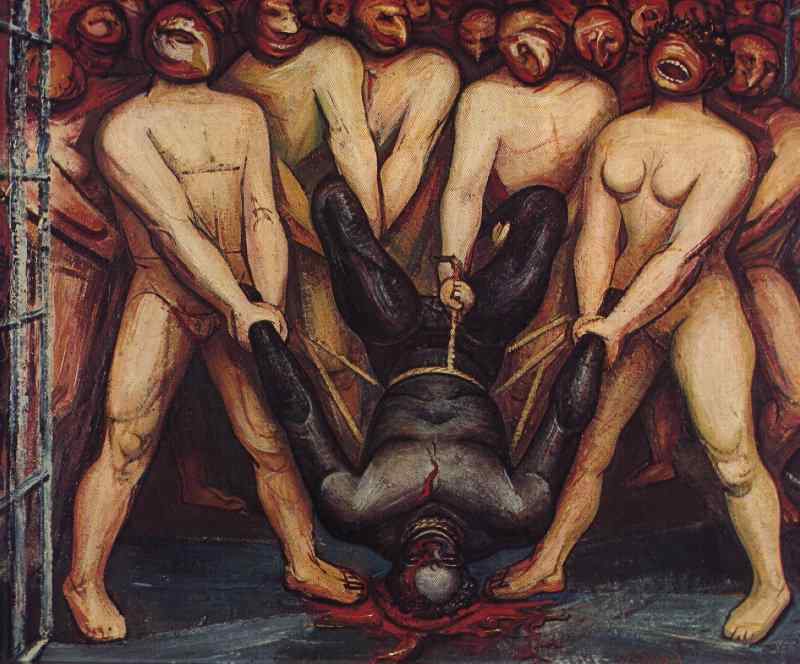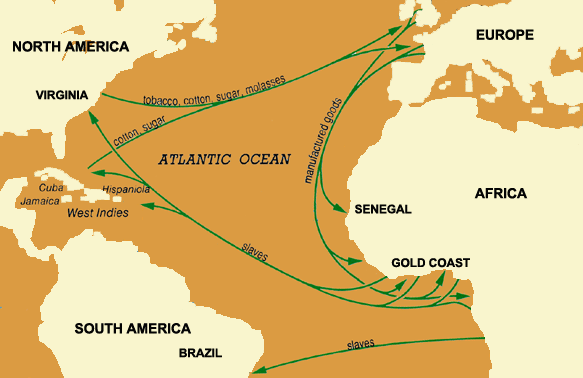
West African slaving as a source of Caribbean labor
How are war, human bondage and capitalism related?
Population | Slave Trade | Labor | Revolt | Dates | Summary
International Rivalry 1713-1815

The Triangular Trade: an initial international commercial endeavor.
Spanish monarchy, Bourbon dynastic reforms
Loss of the War of Spanish Succession to France led to changes in the Spanish world empire.
Population changes and comparisons:
By 1600 there where 300,000 Spanish settlers in the Caribbean as compared to 30,000 Portuguese in all of Brazil.
(p. 125)
Of Venezuela's 111,000 slaves in 1800; 87,000 Africans in bondage there were 24,000 fugitive slaves (runaways to gain freedom).
Cuba's population grew from 171,000 in 1774 to 1.4 million in 1861 of which 30% were descended from nearly 600,000 African slaves.
(p. 206)
By 1900, 15 million people lived in Mexico; 9.5 million were landless peons, and 12 million lived in rural areas.
(p. 223)
18th century social and intellectual conditions
"neo medieval climate of opinion..."
(p. 143)
"An individual's race, in short, now tended to be defined not by skin color but by such traits as occupation, dress, speech and self perception."
(p. 150; 7th edition)
"A growing number of wealthy mestizo and mulatto families sought to rise in the social scale by marrying their sons and daughters to children of the white elite."
(p. 150, 7th edition))
"Continuing hold of racial prejudice and stereotypes on the colonial mentality"
(p. 150; 7th edition)
The awakening of equality in the colonies and abolition of slavery.
Labor conditions
Mexico (Nova Hispania) possessed the most diversified economy in the 18th century:
tobacco, sugar, cacao, coffee, hide and tallow trade (cattle), ceramics, silver crafts, silver mining, and textiles all contributed to Mexican wealth
Working class identity and skilled worker unrest
(p. 139)
Revolt of the masses
How are war, human bondage and capitalism related?
Imperial rivalry lead to heavy fiscal burdens on Britain, France and Spain.
Britain by gaining a monopoly, in 1713, on the slave trade raised enormous sums of money but simultaneously set in motion religious opposition to slavery and political agitation to terminate the Atlantic slave trade by 1807.
Britain's loss of North America caused the West Indies to become more prominent.
Wars of revolution and the Napoleonic Wars lead to the demise of the French and Spanish empires in America, to the advantage of British and US commerce.
Agrarian monopoly and Creole's often reactionary power failed to create equality after liberty was acquired from Spain.
(p. 175)
"there is ample evidence of systematic brutality" in Latin slavery, the institution was abolished in Mexico in 1823, Puerto Rico in 1873, Cuba in 1880, and Brazil in 1888.
(pp. 254-55)
Slavery became an economic burden at a time when radical Christian theology rejected the moral justifications used to sanction the "peculiar institution." At the same time Afro-Caribbean religion played a significant organizing role justifying and spreading resistance to slavery, often leading to slave revolts.
Yet the slave revolts spread fear among the Creole elites and when the Haitian Revolution of 1804 was successful, French Creoles brought their reactionary beliefs to Cuba, Mexico, New Orleans --which was then Spanish-- and Charleston. Reaction against the French Revolution's liberal or "Jacobin ideals" met widespread resistance in the Indies and a separation of the Creole class from mulattos and mestizos.
This division in Mexico became crucial to the success of the Mexican Revolution of 1810 in breaking away from Spain, but engendered an incomplete revolution in the sense that Creole land holdings and class suppression of Indians and mestizos persisted until the expulsion of the Dictator Diaz, in 1910.